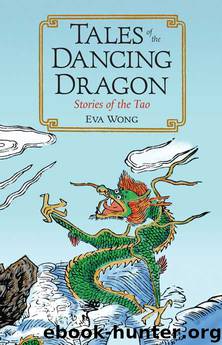Tales of the Dancing Dragon by Eva Wong

Author:Eva Wong
Language: eng
Format: epub
Publisher: Shambhala Publications
17
Lu Xiujing’s Compilation of the Taoist Scriptures
DURING THE SIX DYNASTIES (fifth to sixth century), in the kingdom of Song,1 there lived a Taoist scholar and sage named Lu Xiujing.
Legends tell us that Lu Xiujing was born under unusual circumstances. First, he was conceived after his parents had given up hope of having children. In addition, when Xiujing was born, a mysterious Taoist appeared at the gate of the Lu mansion asking to see the child. Looking at the infant, the Taoist exclaimed, “This child is destined to do great deeds. Kings and nobles will seek his advice, and the future of Taoism will be in his hands.” Xiujing’s parents were not convinced. Their child was neither beautiful nor handsome. In fact, Xiujing had an unnaturally large head and a short torso, and as he grew up, his ugliness became even more apparent.
Xiujing had few friends and did not care for social life. He lived in seclusion and spent much of his time studying the Taoist scriptures and practicing the arts of longevity. At his parents’ request, Xiujing married and sired children, but after his sons came of age, he left home and wandered off to the mountains to gather herbs and minerals to concoct the pill of immortality.
It is not known from whom Lu Xiujing received the teachings of Taoism. He was not initiated into the Celestial Teacher’s Way founded by Zhang Daoling; nor was he affiliated with the Shangqing School founded by Lady Wei Huacun. However, Xiujing was more knowledgeable in the scriptures of those two schools than the clergy of those lineages. Most likely he studied with unknown hermits and immortals while he was wandering in the mountains of Heng, Omei, and Luofo. It was on the slopes of Mount Luofo that Lu Xiujing settled as a hermit. His reputation as the leading authority on Taoism grew, and he was often visited by scholars, priests, and practitioners seeking advice.
One time when Lu Xiujing was in the capital selling herbs and visiting fellow practitioners, a message came from the imperial court inviting him to meet with the emperor. Both the Song emperor and the queen mother were devoted followers of Taoism, and at their request Xiujing consented to stay at the court temporarily to advise the king.
Not long after Xiujing became the royal family’s spiritual adviser, the imperial court was embroiled in a conspiracy that affected ministers, generals, and the court priesthood. The crown prince conspired with his sister and a younger brother to assassinate the emperor. They approached a group of Celestial Teacher’s priests for help, promising wealth, rank, and titles should the plan to put the crown prince on the throne succeed. The priests obtained from the eunuch attendants the emperor’s hair and dried semen in an attempt to use black magic to slay the king. As fate would have it, one of the eunuchs, disgruntled with the small amount of reward allotted to him, informed the emperor of the plot. When the conspiracy was uncovered, a large number of ministers, generals, and nobility were implicated.
Download
This site does not store any files on its server. We only index and link to content provided by other sites. Please contact the content providers to delete copyright contents if any and email us, we'll remove relevant links or contents immediately.
| Confucianism | Feng Shui |
| I Ching | Jainism |
| Karma | Shintoism |
| Sikhism | Tao Te Ching |
| Taoism | Tibetan Book of the Dead |
| Zoroastrianism |
The Tao of Physics by Fritjof Capra(2276)
Human Design by Chetan Parkyn(2072)
The Diamond Cutter by Geshe Michael Roach(2060)
Feng Shui by Stephen Skinner(1940)
The Alchemy of Sexual Energy by Mantak Chia(1860)
Tao Te Ching by Lao Tzu(1841)
365 Tao: Daily Meditations by Ming-Dao Deng(1621)
Tao Tantric Arts for Women by Minke de Vos(1599)
Sun Tzu's The Art of War by Giles Lionel Minford John Tzu Sun(1541)
Sidney Sheldon (1982) Master Of The Game by Sidney Sheldon(1520)
Buddhism 101 by Arnie Kozak(1512)
Karma-Yoga and Bhakti-Yoga by Swami Vivekananda(1495)
The Analects of Confucius by Burton Watson(1436)
The Art of War Other Classics of Eastern Philosophy by Sun Tzu Lao-Tzu Confucius Mencius(1428)
Tao te ching by Lao Tzu(1366)
The Way of Chuang Tzu by Thomas Merton(1364)
The New Bohemians Handbook by Justina Blakeney(1355)
The Sayings Of by Confucius(1316)
Bless This House by Donna Henes(1270)
